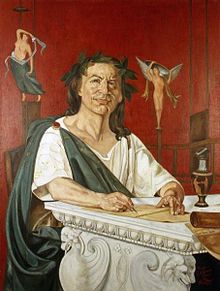(Horace, Carmina I, v “Quis multa
gracilis te puer in rosa...”)
What graceful half-god
embraces you,
crushing you on heaps of roses?
Have you caught him with artless curls?
He’ll come to tears over you.
He’ll dive into your eyes’ black seas
to drown where others have. Too bad
your eyes are deeper than your soul.
I was luckier. I got away.
Shipwrecked Romans come safe to shore
offered plaques and their sea-soaked tunics
to thank the ocean. I scrawled my thanks
on a bathhouse wall and left my jeans
in a puddle in a shower stall.
crushing you on heaps of roses?
Have you caught him with artless curls?
He’ll come to tears over you.
He’ll dive into your eyes’ black seas
to drown where others have. Too bad
your eyes are deeper than your soul.
I was luckier. I got away.
Shipwrecked Romans come safe to shore
offered plaques and their sea-soaked tunics
to thank the ocean. I scrawled my thanks
on a bathhouse wall and left my jeans
in a puddle in a shower stall.

Quinto Orazio Flacco -- Giacomo Di Chirico
Quintus Horatius Flaccus ("Horace") was a 1st-century BCE poet. In the next century Marcus Fabius Quintilianus said, "He can be lofty sometimes, yet he is also full of charm and grace, versatile in his figures, and felicitously daring in his choice of words." A well-educated former slave, he was recruited into the army by Marcus Junius Brutus in Athens after the 44 BCE assassination of Gaius Julius Caesar but fled without his shield when Brutus was defeated by Octavianus and Marcus Antonius at Philippi in 42 BCE. He accpted the amnesty offered by Octavianus and became one of the literary propagandists recruited by Octaviunus' close adviser Gaius Cilnius Maecenas and began writing satires (written in two periods, ca. 35-345 and 30 BCE) and epodes (30 BCE). He was probably with Maecenas during the campaign against the piratical Sextus Pompeius in 36 BCE and at Actium in 31 BCE, where Octavianus defeated Antonius. Around 23 BCE he adapted 7th-and-6th century BCE Greek poetry into his early Odes (Carmina). After Octavianus became Imperator Caesar Divi Filius Augustus, the new emperor wanted Horatius to become his secretary, but the poet declined; however, he acceeded to his request to produce a second volume of poetic Epistles in 11 BCE that celebrated the deeds of the emperor and his stepsons Nero Claudius Drusus Germanicus and the future emperor Tiberius Julius Caesar. He closed his literary career with his "Ars Poetica" before dying in 8 BCE at 56, soon after Maecenas. (Both of them bequeathed their property to the emperor, as was expected of his friends.) Dante referred to him as "Orazio satiro: and placed him in the first circle of Hell (for pre-Christian worthies) with Homeros, Publius Ovidius Naso, and Marcus Annaeus Lucanus.
ReplyDelete